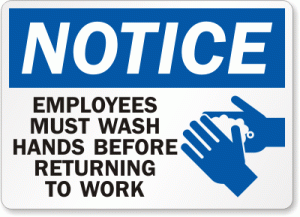“…the Oregon Health Authority’s Foodborne Illness Prevention department said the measure was created to prevent the spread of norovirus, the most common cause of food poisoning. It’s often spread through improper  hand washing by employees after they use the bathroom… a 2003 health authority survey in which restaurant inspectors found at least one hand-washing violation at nearly two-thirds of Oregon eateries…”
hand washing by employees after they use the bathroom… a 2003 health authority survey in which restaurant inspectors found at least one hand-washing violation at nearly two-thirds of Oregon eateries…”
Oregon restaurant owners and chefs recently earned a small victory, delaying by several months a new state rule that could make dining out more expensive, create waste and, despite its good intentions, do little to protect public health.
The rule, initially set to take effect Sunday, would require cooks to wear gloves or otherwise avoid touching food with their bare hands. But restaurant owners argued the requirement won’t prove safer than the state’s current rigorous hand-washing practices — and the science seems to back them up.
At least a half-dozen recent studies have concluded the same: Counterintuitively, wearing gloves does little to prevent the spread of bacteria compared with effective hand washing. Wearing gloves has been found to reduce the number of times people wash their hands, while warm, moist conditions create a hothouse for bacteria to grow. A 2005 report from the University of Oklahoma Health Sciences Center that analyzed grilled tortillas found more staph, coliform and other harmful bacteria on the samples prepared by workers wearing gloves.
“Gloves lead to a bulletproof-vest feeling,” said Bryan Steelman, owner of the Mexican eatery Por Que No? and among the restaurateurs leading the charge against the new rule. “Cooks think, ‘I have a glove on. I don’t need to wash my hands.'”
For more:Â http://www.oregonlive.com/dining/index.ssf/2012/06/oregon_restaurateurs_fight_new.html







